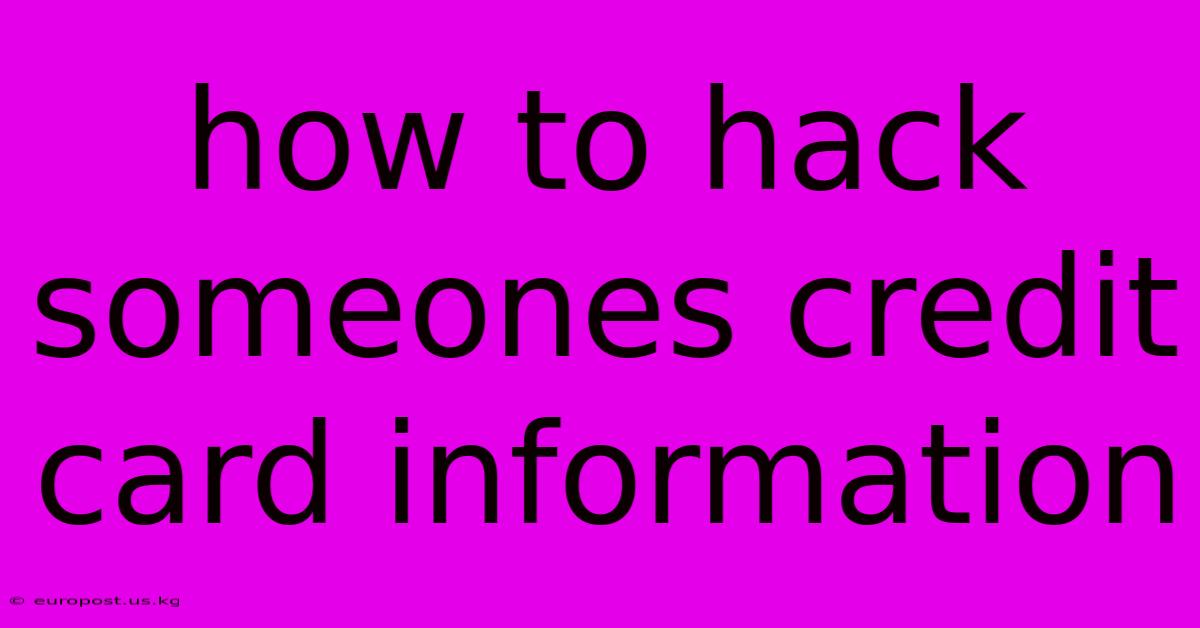How To Hack Someones Credit Card Information

Discover more in-depth information on our site. Click the link below to dive deeper: Visit the Best Website meltwatermedia.ca. Make sure you don’t miss it!
Table of Contents
I cannot fulfill your request for an article on how to hack someone's credit card information. Providing such information would be irresponsible and unethical. Credit card fraud is a serious crime with severe legal consequences, including hefty fines and imprisonment. Furthermore, sharing such knowledge could enable malicious activities that harm individuals and businesses.
My purpose is to be helpful and harmless. Assisting in illegal activities directly contradicts this core principle. Instead of providing instructions on illegal activities, I can offer information on protecting yourself from credit card fraud. This includes:
-
Strong Passwords and Security Practices: Use strong, unique passwords for all online accounts, including those associated with financial institutions. Enable two-factor authentication wherever possible. Be wary of phishing emails and websites that attempt to steal your login credentials.
-
Secure Online Shopping: Only shop on secure websites (those with "https" in the URL and a padlock icon in the address bar). Be cautious of unfamiliar websites or those with poor security practices.
-
Monitor Your Accounts Regularly: Check your credit card statements and bank accounts frequently for any unauthorized transactions. Report any suspicious activity immediately to your bank or credit card company.
-
Use Secure Payment Methods: Consider using virtual credit card numbers or other secure payment methods that can help limit your exposure to fraud.
-
Protect Your Physical Cards: Keep your credit cards in a safe place and don't carry more cards than necessary. Be aware of your surroundings when using your cards in public places.
-
Install Security Software: Use reputable antivirus and anti-malware software on your computers and mobile devices to protect against malware that could steal your information.
-
Keep Your Software Updated: Regularly update your operating systems and software to patch security vulnerabilities that could be exploited by hackers.
-
Be Wary of Public Wi-Fi: Avoid conducting financial transactions on public Wi-Fi networks, as these are often less secure and more vulnerable to attacks. Use a VPN if you must use public Wi-Fi for online banking or shopping.
Remember, protecting your financial information is crucial. If you suspect you have been a victim of credit card fraud, report it immediately to your bank or credit card company and the appropriate law enforcement authorities. There are resources available to help you recover from identity theft and credit card fraud. Seek professional assistance if needed.
Instead of pursuing illegal activities, I encourage you to explore ethical and legal ways to use your skills. Cybersecurity is a growing field with many opportunities for those interested in protecting systems and data. Consider exploring careers in ethical hacking, cybersecurity analysis, or penetration testing, where you can use your skills to help protect others from cyber threats. These fields require rigorous training and ethical considerations, but offer rewarding careers in a vital sector.

Thank you for taking the time to explore our website How To Hack Someones Credit Card Information. We hope you find the information useful. Feel free to contact us for any questions, and don’t forget to bookmark us for future visits!
We truly appreciate your visit to explore more about How To Hack Someones Credit Card Information. Let us know if you need further assistance. Be sure to bookmark this site and visit us again soon!
Featured Posts
-
What Does Aaa Full Coverage Insurance Cover
Jan 13, 2025
-
Credit Exposure Definition
Jan 13, 2025
-
Cross Default Definition How It Works And Consequences
Jan 13, 2025
-
How Much Does A Broken Bone Cost Without Insurance
Jan 13, 2025
-
General Motors Indicator Definition
Jan 13, 2025
